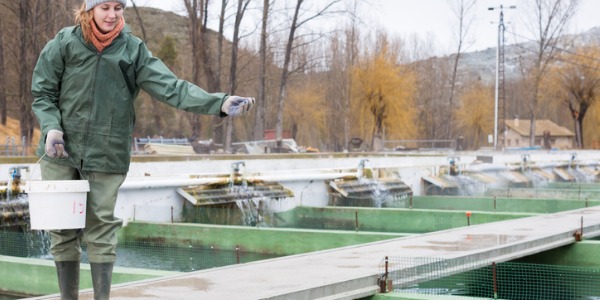What is an Aquacultural Manager?
Aquacultural managers work at facilities that grow and harvest marine plants, fish, or shellfish for commercial sale or for keeping wildlife stocks replenished. They come up with ways to improve hatching and growth rates, and do their best to steer disease away in hatcheries. They keep an eye on environments to ensure they maintain the best conditions possible for aquatic life.
Aquacultural managers also supervise and train aquaculture and fish hatchery workers. They are usually employed by private or public fish hatcheries and commercial aquatic farms.
What does an Aquacultural Manager do?
An aquacultural manager is a professional responsible for managing and overseeing aquaculture operations, which is the farming of aquatic organisms such as fish, shellfish, and seaweed.

The day-to-day activities of an aquacultural manager can vary depending on the size and type of aquaculture operation they manage. A typical day for an aquacultural manager can be physically demanding, with long hours and exposure to the elements. However, it can also be rewarding, as they are responsible for ensuring the success and profitability of the aquaculture operation they manage. Some common tasks and responsibilities may include:
- Monitoring the health and growth of aquatic species: Checking water quality, feeding the animals, and observing their behavior are important tasks for ensuring their health and survival.
- Maintaining equipment and facilities: Ensuring that pumps, filters, and other equipment are functioning properly and that the facilities are in good condition.
- Supervising and training staff: Aquacultural managers may oversee and direct the work of farm workers, technicians, and other personnel. They may also provide training and support to help them develop their skills.
- Recording and analyzing production data: Keeping accurate records of production, stock, and financial performance, and using this information to make informed decisions about the operation.
- Coordinating with suppliers, buyers, and other stakeholders: Communicating with suppliers to ensure timely delivery of feed and other supplies, and working with buyers to ensure that their orders are fulfilled.
- Complying with regulations and standards: Ensuring that the aquaculture operation complies with all relevant regulations and environmental standards.
- Conducting research and development: Conducting experiments and testing new methods and technologies to improve aquaculture methods and production.
- Preparing reports and budgets: Preparing regular reports on the operation's performance, including financial statements and budgets.
What is the workplace of an Aquacultural Manager like?
Aquacultural managers typically work in aquaculture facilities, such as fish hatcheries, shellfish farms, and seaweed farms. They may also work in research facilities, government agencies, or private consulting firms.
The work can be both challenging and rewarding, as aquacultural managers are responsible for ensuring the success and profitability of the aquaculture operation. They must have excellent organizational and problem-solving skills, as well as the ability to make informed decisions about the operation in real-time.
Aquacultural managers must also be able to work effectively with a team, including farm workers, technicians, and other personnel, and communicate effectively with suppliers, buyers, and other stakeholders in the aquaculture industry.
Overall, the workplace of an aquacultural manager is fast-paced and dynamic, requiring strong leadership and management skills, as well as a deep understanding of the science and technology of aquaculture.
Aquacultural Managers are also known as:
Aquacultural Director
Aquacultural Farm Manager